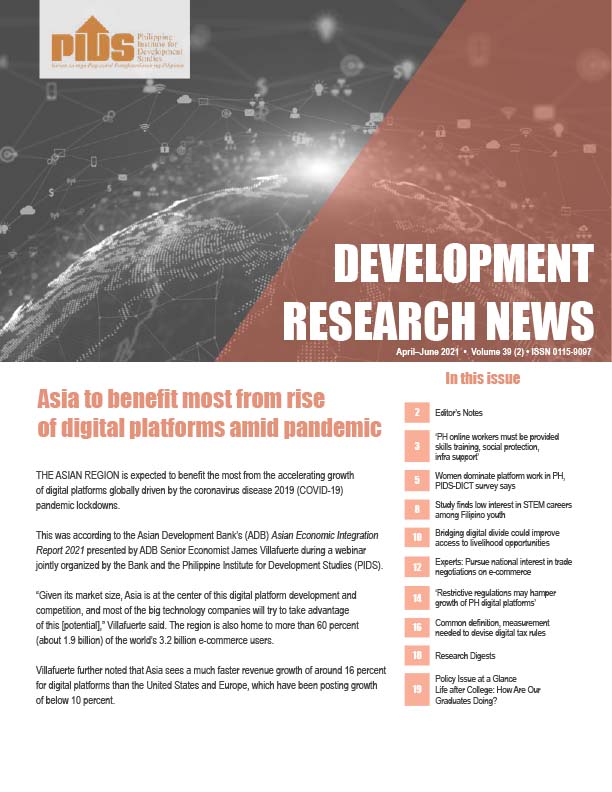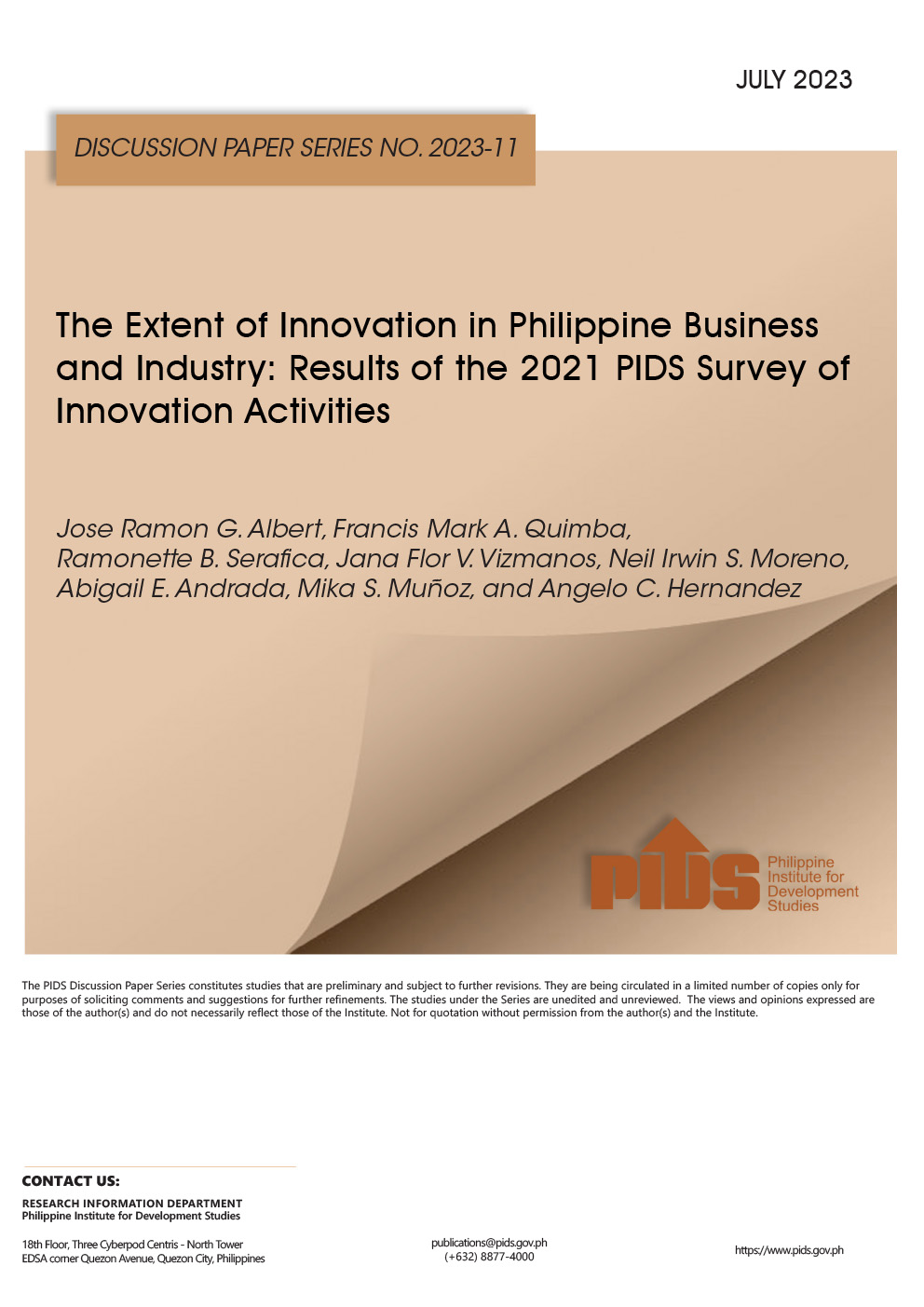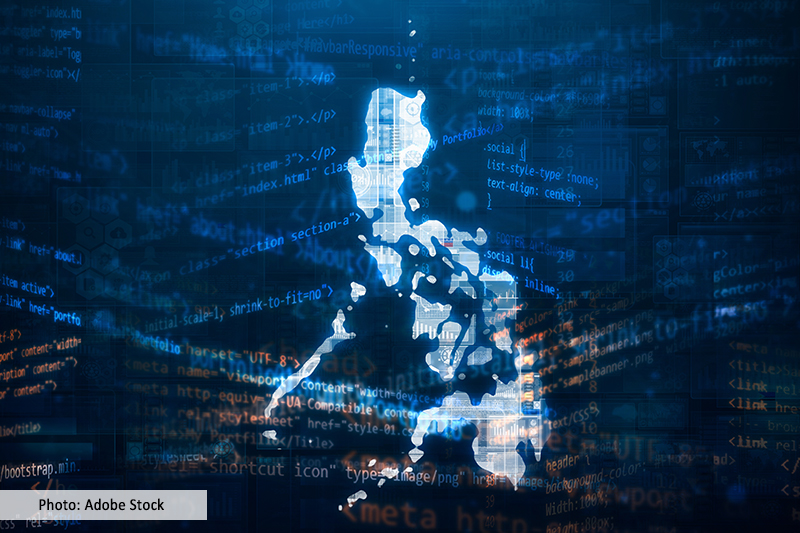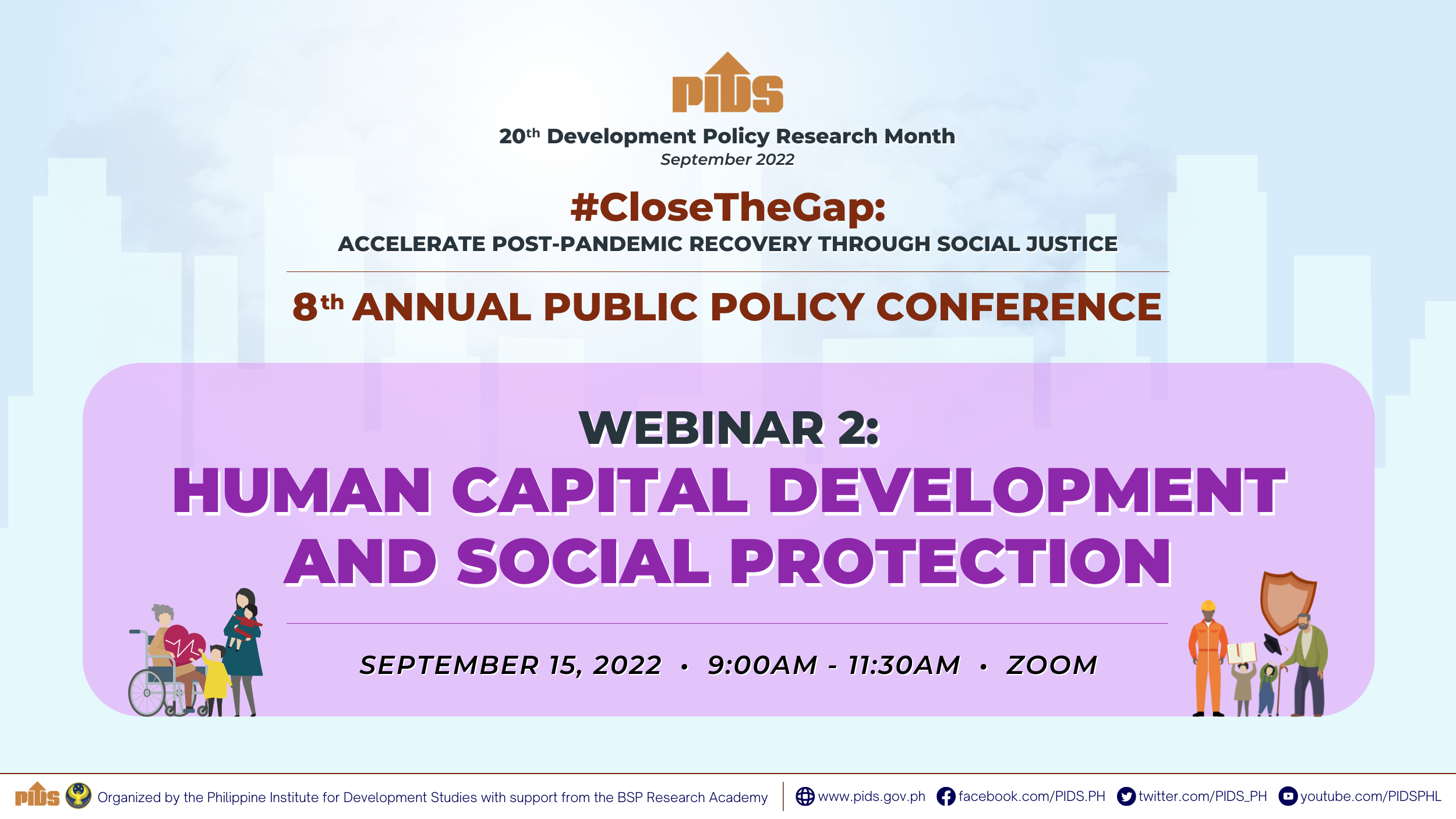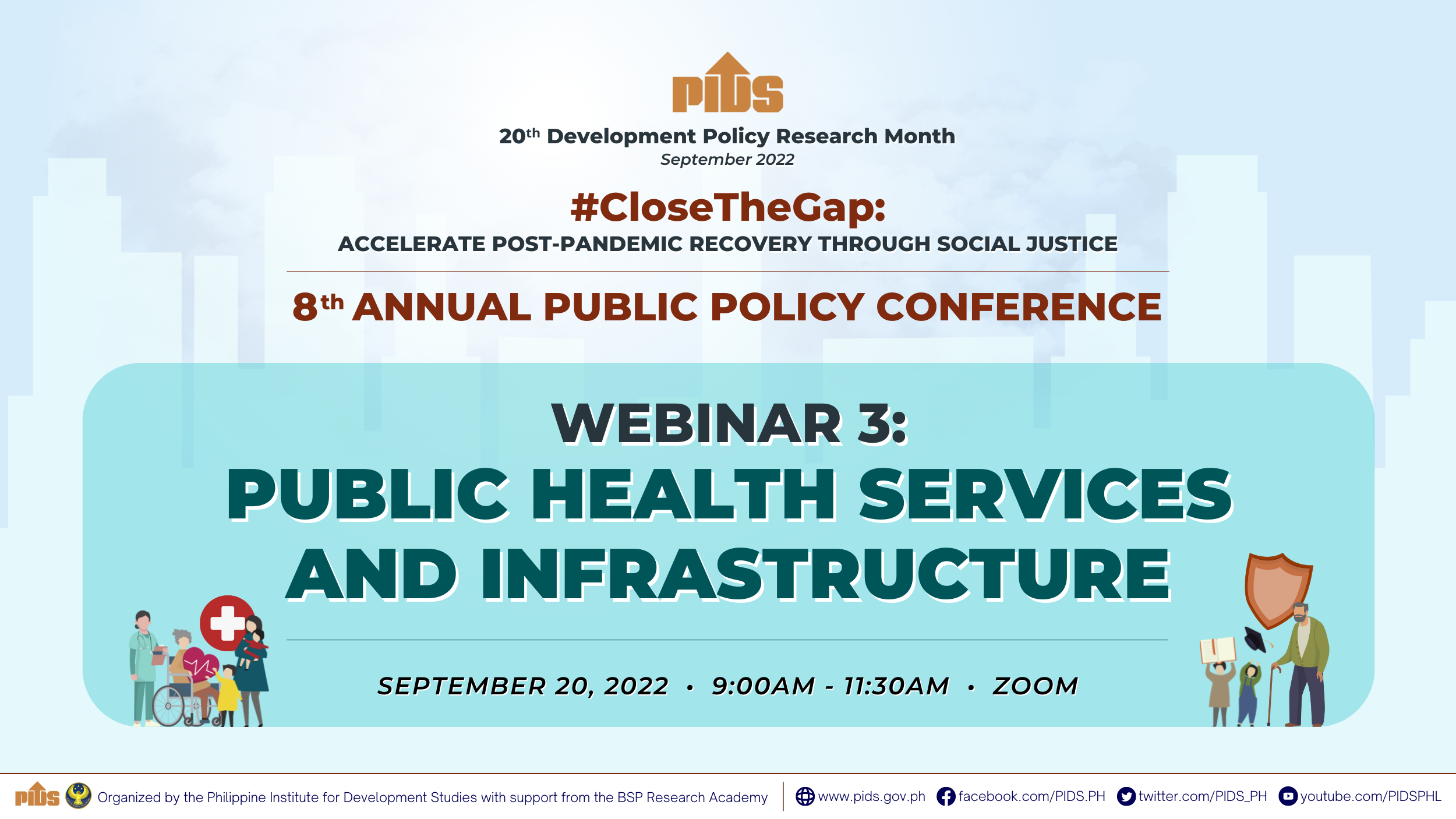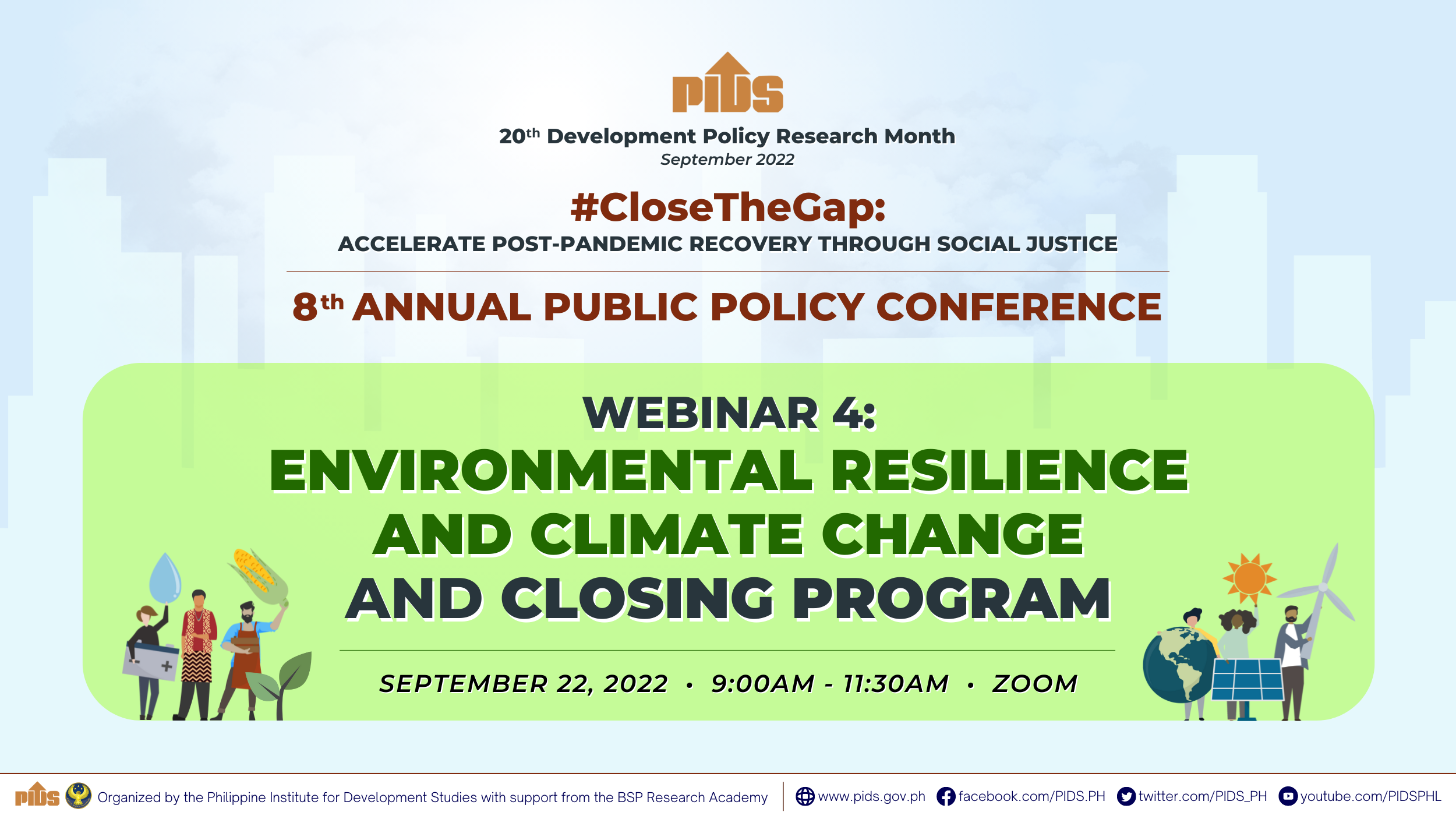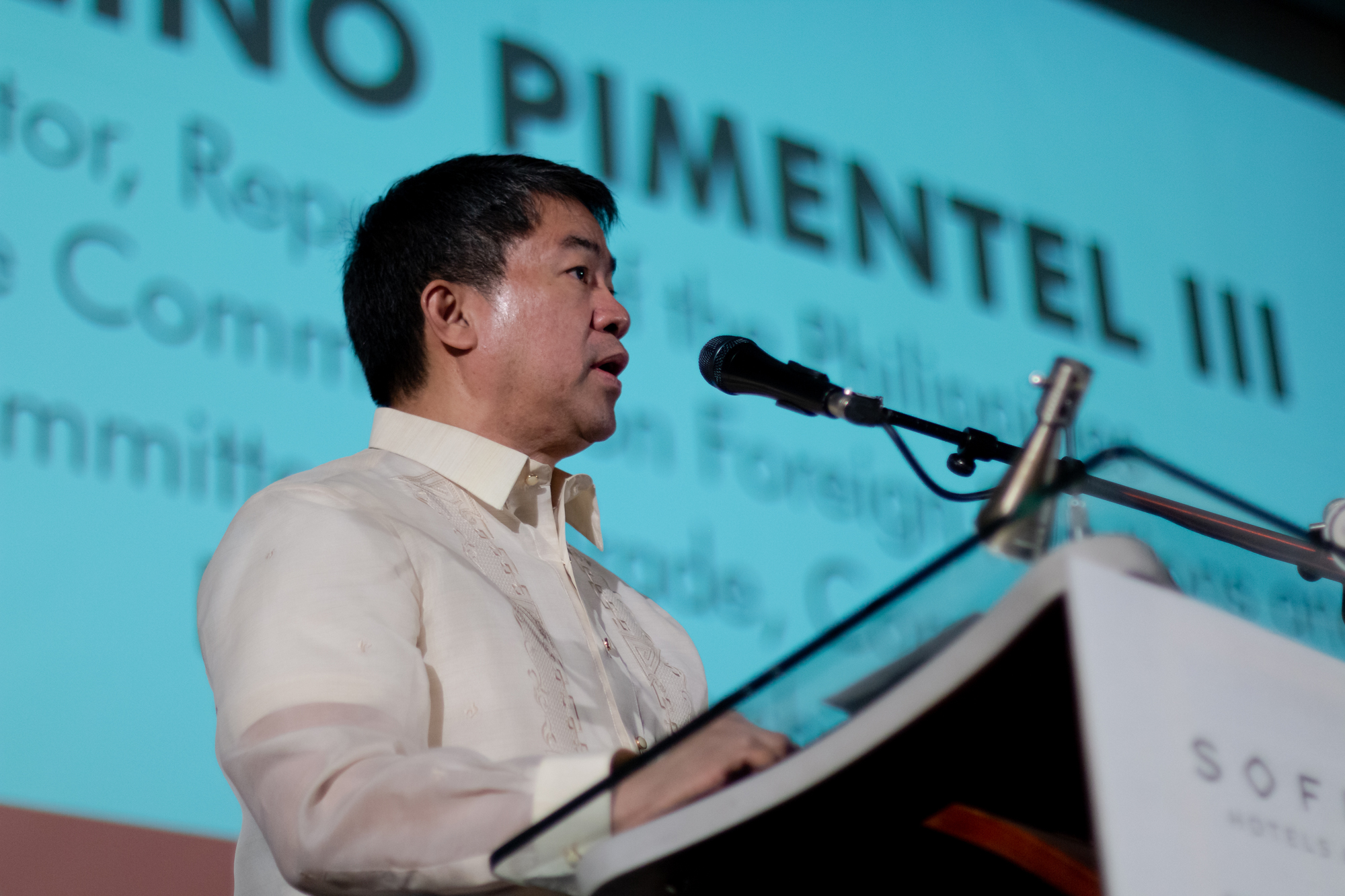
“The Philippines must be prepared to newness not only in globalization but also in everything.”
This, Senator Aquilino “Koko” Pimentel III, chair of the Senate Committee on Foreign Relations and Committee on Trade, Commerce, and Entrepreneurship, underscored in his message during the fifth Annual Public Policy Conference (APPC) held in Pasay City recently.
Directing his remark to the country’s planners and policymakers, Pimentel said they “must always be open to change” as “the increasingly integrated global economy is here to stay,” hence, they “must have not only the attitude but also the aptitude to anticipate the future and prepare for change”.
The future he is referring to is the New Globalization, also known as Globalization 4.0, an era characterized by volatility, uncertainty, complexity, and ambiguity.
A paper published by the Philippine Institute for Development Studies (PIDS) titled “Understanding the New Globalization: Implications for the Philippines”, written by PIDS Research Fellows Roehlano Briones, Connie Dacuycuy, Michael Abrigo, and Francis Mark Quimba, explains that the new globalization has four key features, namely, economic trade restructuring, worsening global inequality, threats to international cooperation in providing global public goods, and weakening of social cohesion and trust.
One of the initiatives of the Philippine Senate to prepare the country for these challenges, said Pimentel, is the newly organized Committee on Sustainable Goals, Innovation, and Futures Thinking. Said committee, to be chaired by Senator Pia Cayetano, will help the Senate “anticipate, keep up, and properly react to our fast-changing world, which is caused by the rapidly changing preferences and behaviors of people”.
New work world order
Rapid change resulting from automation and digitization is particularly affecting the labor sector, giving rise to job displacements, especially in manufacturing.
“The main task at hand is to craft policies to make us adaptive to the changing world,” explained Undersecretary Ciriaco Lagunzad III of the Department of Labor and Employment.
Although Philippine businesses trail behind those in neighboring countries like Singapore and Malaysia, Dr. Alfredo Pascual, president of the Institute of Corporate Directors, noted that “with technology access and the right tools, they can gain traction and stay competitive.”
Under the new globalization, “more aggressive and robust competition policy” is needed, said Arsenio Balisacan, chair of the Philippine Competition Commission. Currently, competition is quite restrictive in the Philippines.
Going into digitization is one of the strategies of businesses to cope with the technological advancement and remain competitive. “The growing and expanding community of start-up companies, whose basic business models are dependent on digital technology, is proof that digital transformation is critical in the age of the Fourth Industrial Revolution,” Pascual said.
Digitization, particularly in the financial sector, however, can pose risks to consumers. Concerns in “consumer protection, loss of funds, improper use of personal data, and possible use for money laundering and terrorist financing purposes” are some of those risks, according to Francisco Dakila Jr., deputy governor of the Bangko Sentral ng Pilipinas (BSP).
As such, the BSP has put in place a strong regulatory framework to safeguard the country’s financial sector. Dakila stressed that, “striking the right balance is important [in the financial sector] to allow innovation to flourish and at the same time manage risks properly.”
Enhance innovation
Innovation is a key to increase the productivity of micro, small, and medium enterprises (MSMEs), which comprise 99.56 percent of the total business enterprises in the country as of 2017, according to Philippine Statistics Authority (PSA) data.
However, MSMEs are usually hindered by high innovation cost as well as other barriers such as knowledge and market factors.
The innovation activity in the country is mostly concentrated among large firms. The 2015 Survey of Innovation Activities (SIA) conducted by PIDS showed that less than half of the firms in the Philippines were innovators.
Moreover, the country remains weak in the areas of ease of starting a business, ease of getting credit, expenditure on education, global research and development companies, scientific and technical articles, and new businesses. This was revealed in the latest Global Innovation Index (GII) 2019, which reported the Philippines ranking 54th out of 129 economies.
Create a culture of science, invest in education
Department of Foreign Affairs Undersecretary Lourdes Yparraguirre highlighted the importance of investing in human resources to cope with the rapid technological change.
Lagunzad echoed the same sentiment by explaining the role of education. By investing in education, the country can capacitate its people to properly respond to the changes and challenges brought by the new globalization. “Education is important in laying the foundation of global skills,” he said.
Education will enable the lower-income bracket of society to obtain better jobs and transition to a higher income level. Higher income results in greater market power which can decrease wealth inequality.
As of 2015, about 2.2 million Filipinos still live below the poverty according to PSA data.
Pimentel believes that the country “must develop a culture of science if it wants to succeed as a nation in the new world order”.
Because science drives most of the changes in the society today, it is important that “the human resource enhancement must be complemented by science and technology (S&T) to ensure that the skills that are developed match the demand of businesses,” Yparraguirre explained.
“How can we live in a highly scientific and technological world if we do not have a culture of science?,” Pimentel asked.
Pimentel called on PIDS to help in preparing the country for the new world arrangement and to help fight corruption as it is a socioeconomic issue that remains to be one of the many challenges of a modern society.
“Our primary goal must be fair progress,” he concluded.
The APPC is the main and culminating activity of the Development Policy Research Month (DPRM), an annual celebration held every September in view of Proclamation 247 issued in 2002 to promote public awareness and appreciation of the importance of policy research in the formulation of evidence-based public policies, programs, and projects. This year’s DPRM celebration carried the theme “Navigating the New Globalization: Local Actions for Global Challenges”, which was also the theme of the fifth APPC.
This, Senator Aquilino “Koko” Pimentel III, chair of the Senate Committee on Foreign Relations and Committee on Trade, Commerce, and Entrepreneurship, underscored in his message during the fifth Annual Public Policy Conference (APPC) held in Pasay City recently.
Directing his remark to the country’s planners and policymakers, Pimentel said they “must always be open to change” as “the increasingly integrated global economy is here to stay,” hence, they “must have not only the attitude but also the aptitude to anticipate the future and prepare for change”.
The future he is referring to is the New Globalization, also known as Globalization 4.0, an era characterized by volatility, uncertainty, complexity, and ambiguity.
A paper published by the Philippine Institute for Development Studies (PIDS) titled “Understanding the New Globalization: Implications for the Philippines”, written by PIDS Research Fellows Roehlano Briones, Connie Dacuycuy, Michael Abrigo, and Francis Mark Quimba, explains that the new globalization has four key features, namely, economic trade restructuring, worsening global inequality, threats to international cooperation in providing global public goods, and weakening of social cohesion and trust.
One of the initiatives of the Philippine Senate to prepare the country for these challenges, said Pimentel, is the newly organized Committee on Sustainable Goals, Innovation, and Futures Thinking. Said committee, to be chaired by Senator Pia Cayetano, will help the Senate “anticipate, keep up, and properly react to our fast-changing world, which is caused by the rapidly changing preferences and behaviors of people”.
New work world order
Rapid change resulting from automation and digitization is particularly affecting the labor sector, giving rise to job displacements, especially in manufacturing.
“The main task at hand is to craft policies to make us adaptive to the changing world,” explained Undersecretary Ciriaco Lagunzad III of the Department of Labor and Employment.
Although Philippine businesses trail behind those in neighboring countries like Singapore and Malaysia, Dr. Alfredo Pascual, president of the Institute of Corporate Directors, noted that “with technology access and the right tools, they can gain traction and stay competitive.”
Under the new globalization, “more aggressive and robust competition policy” is needed, said Arsenio Balisacan, chair of the Philippine Competition Commission. Currently, competition is quite restrictive in the Philippines.
Going into digitization is one of the strategies of businesses to cope with the technological advancement and remain competitive. “The growing and expanding community of start-up companies, whose basic business models are dependent on digital technology, is proof that digital transformation is critical in the age of the Fourth Industrial Revolution,” Pascual said.
Digitization, particularly in the financial sector, however, can pose risks to consumers. Concerns in “consumer protection, loss of funds, improper use of personal data, and possible use for money laundering and terrorist financing purposes” are some of those risks, according to Francisco Dakila Jr., deputy governor of the Bangko Sentral ng Pilipinas (BSP).
As such, the BSP has put in place a strong regulatory framework to safeguard the country’s financial sector. Dakila stressed that, “striking the right balance is important [in the financial sector] to allow innovation to flourish and at the same time manage risks properly.”
Enhance innovation
Innovation is a key to increase the productivity of micro, small, and medium enterprises (MSMEs), which comprise 99.56 percent of the total business enterprises in the country as of 2017, according to Philippine Statistics Authority (PSA) data.
However, MSMEs are usually hindered by high innovation cost as well as other barriers such as knowledge and market factors.
The innovation activity in the country is mostly concentrated among large firms. The 2015 Survey of Innovation Activities (SIA) conducted by PIDS showed that less than half of the firms in the Philippines were innovators.
Moreover, the country remains weak in the areas of ease of starting a business, ease of getting credit, expenditure on education, global research and development companies, scientific and technical articles, and new businesses. This was revealed in the latest Global Innovation Index (GII) 2019, which reported the Philippines ranking 54th out of 129 economies.
Create a culture of science, invest in education
Department of Foreign Affairs Undersecretary Lourdes Yparraguirre highlighted the importance of investing in human resources to cope with the rapid technological change.
Lagunzad echoed the same sentiment by explaining the role of education. By investing in education, the country can capacitate its people to properly respond to the changes and challenges brought by the new globalization. “Education is important in laying the foundation of global skills,” he said.
Education will enable the lower-income bracket of society to obtain better jobs and transition to a higher income level. Higher income results in greater market power which can decrease wealth inequality.
As of 2015, about 2.2 million Filipinos still live below the poverty according to PSA data.
Pimentel believes that the country “must develop a culture of science if it wants to succeed as a nation in the new world order”.
Because science drives most of the changes in the society today, it is important that “the human resource enhancement must be complemented by science and technology (S&T) to ensure that the skills that are developed match the demand of businesses,” Yparraguirre explained.
“How can we live in a highly scientific and technological world if we do not have a culture of science?,” Pimentel asked.
Pimentel called on PIDS to help in preparing the country for the new world arrangement and to help fight corruption as it is a socioeconomic issue that remains to be one of the many challenges of a modern society.
“Our primary goal must be fair progress,” he concluded.
The APPC is the main and culminating activity of the Development Policy Research Month (DPRM), an annual celebration held every September in view of Proclamation 247 issued in 2002 to promote public awareness and appreciation of the importance of policy research in the formulation of evidence-based public policies, programs, and projects. This year’s DPRM celebration carried the theme “Navigating the New Globalization: Local Actions for Global Challenges”, which was also the theme of the fifth APPC.

